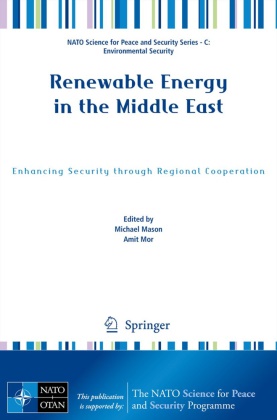Read more
Energy insecurity is not normally associated with the Middle East. However, away from the oil-rich Persian Gulf, the countries of the eastern Mediterranean are particularly vulnerable. Their fossil fuel endowments are low, while their fractious relationships with each other have long fostered wider political insecurities. Focusing on the Jordan Basin (Israel, the Palestinian Territories, Lebanon and Jordan), this timely volume addresses the prospects for the adoption of renewable energy in the oil-poor Middle East. Featuring regional energy experts, it offers an invaluable survey.
After outlining the regional security context, this book first reviews renewable energy policy and practices in the Jordan Basin. It then considers options for greening energy use, including promising pilot projects in North Africa. The initiatives discussed encompass renewable energy finance, energy-efficient rural communities, and solar and wind energy. There is significant potential for an increase in the uptake of renewable energy technologies in the eastern Mediterranean. This window of opportunity has been created by high oil prices, energy infrastructure investment opportunities, and the UN climate change regime. In conclusion, the book considers the institutional conditions for collaborative decision-making on renewable energy. Such cooperation would deliver substantial security and human development benefits to the region, and indeed the world.
List of contents
The Security Context.- Enhancing Security in the Middle East: The Challenges of Regional Cooperation.- Renewable Energy Needs and Strategies of the Region.- Electricity and Renewable Energy - Israel Profile.- The Energy Sector In Jordan - Current Trends And The Potential For Renewable Energy.- Renewable Energy Profile For Lebanon.- Energy Profile and the Potential of Renewable Energy Sources in Palestine.- Greening Regional Energy Use.- Financing Renewable Energy: The Case of Morocco.- Sustainable 'Green' Rural Municipalities.- Solar Energy For Application To Desalination In Tunisia: Description of A Demonstration Project.- Wind Energy in Morocco: Which Strategy for Which Development?.- Institutional Aspects of a Regional and Global Energy System.- Institutional Aspects of Regional Energy Systems.- Energy And Water: Interdependent Production And Use, The Remediation Of Local Scarcity And The Mutuality Of The Impacts Of Mismanagement.- Conclusion: Towards a Renewable Energy Transition in the Middle East and North Africa?.
Summary
Energy insecurity is not normally associated with the Middle East. However, away from the oil-rich Persian Gulf, the countries of the eastern Mediterranean are particularly vulnerable. Their fossil fuel endowments are low, while their fractious relationships with each other have long fostered wider political insecurities. Focusing on the Jordan Basin (Israel, the Palestinian Territories, Lebanon and Jordan), this timely volume addresses the prospects for the adoption of renewable energy in the oil-poor Middle East. Featuring regional energy experts, it offers an invaluable survey.
After outlining the regional security context, this book first reviews renewable energy policy and practices in the Jordan Basin. It then considers options for greening energy use, including promising pilot projects in North Africa. The initiatives discussed encompass renewable energy finance, energy-efficient rural communities, and solar and wind energy. There is significant potential for an increase in the uptake of renewable energy technologies in the eastern Mediterranean. This window of opportunity has been created by high oil prices, energy infrastructure investment opportunities, and the UN climate change regime. In conclusion, the book considers the institutional conditions for collaborative decision-making on renewable energy. Such cooperation would deliver substantial security and human development benefits to the region, and indeed the world.

